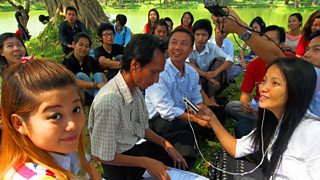
Recording radio programme Lin Lat Kyair Sin (Bright Young Stars) in a Rangoon park
"We would never have dreamed of doing this a year ago."
That's what one young Burmese journalist told me after spending the day recording a �������� radio programme in a popular park in Rangoon. The recording saw 12 journalists and more than 20 guests and audience members come together in Kandawgyi Park. The show, Lin Lat Kyair Sin (Bright Young Stars), is aimed at young adults and tackled the pressing issue of getting information to ethnic minorities and hard-to-reach communities across the whole of Burma.
In Burma, known by its own government as Myanmar, such a public display of media freedom would have been unheard until very recently. It could in the past have led to the arrest of those involved. Even as late as January of this year, Burma was ranked 169th out of 179 nations in terms of press freedom by the media watchdog group Reporters sans Frontieres (RSF).
Headlines around the world have heralded the remarkable political and economic changes happening in Burma. The reforms to the media are striking. For nearly 50 years all media in the country was kept under tight control. Every word broadcast or printed was closely monitored and censored, even song lyrics and fairy tales. Most foreign media, including the ��������, was banned. Over the past two years the Government has been taking a slow march towards media freedom. In August this year they abolished pre-publication censorship of the country's media.
Journalists in Burma have welcomed the reforms unanimously but remain cautiously optimistic. Many repressive laws still exist under which journalists can be punished for writing material which angers or offends the government. When I visited in June this year there was a palpable fear that a reversal of reforms was possible.
However now, in November, there are no suggestions of reversals. "The changes have been too big, we've gone too far now to turn back," they say. Instead, the journalists are looking to the future of media in Burma and examining what needs to be achieved in media regulation.
�������� Media Action is working with young journalists in the country on a range of skills, focusing on building their capacity as radio journalists. As a media trainer with the Burma Horizons project I have spent these past few weeks working with local journalists on their broadcast skills.
Many of the trainees come from a print background so reporting for radio is a new concept. The journalists have worked extensively on how to record and edit a sound-rich radio feature. There was lots of laughter when I introduced Burmese tongue-twisters and the humming of local songs as part of the training to aid their presentation skills.
They are an inspirational group who, despite having had little or no training in journalism, are determined to lead the spread of information in this emerging democracy.
Burma is changing but there is still a long way to go. It's hard to overstate just how many challenges Burma is facing. One-third of the nation lives below the poverty line. The basic infrastructure is massively lacking. The vast majority of the population don’t have access to adequate healthcare.
However despite the obstacles my time here with these brilliant young journalists makes me optimistic about Burma's future. This generation of journalist will undoubtedly be influential not only reporting on, but also in shaping the new Burma.
Related links
